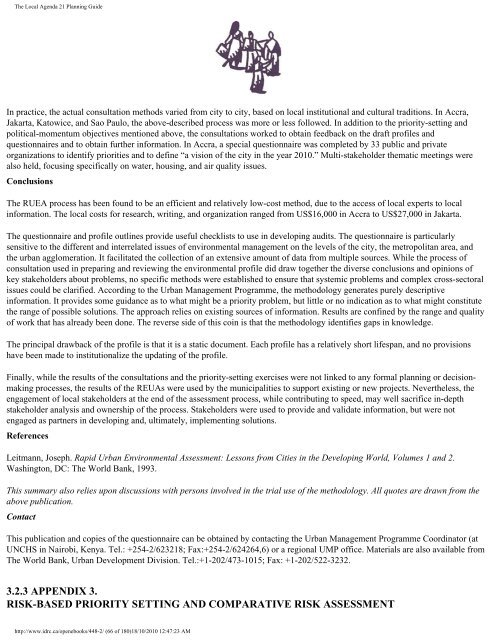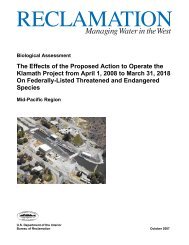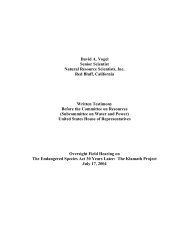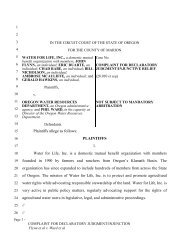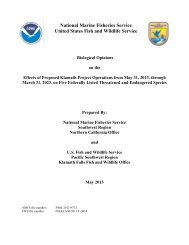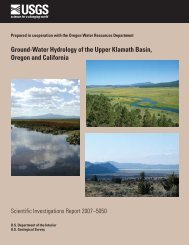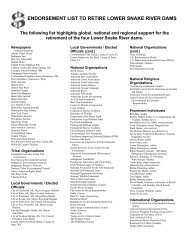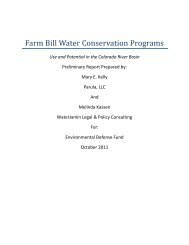The Local Agenda 21 Planning Guide - Democrats Against UN ...
The Local Agenda 21 Planning Guide - Democrats Against UN ...
The Local Agenda 21 Planning Guide - Democrats Against UN ...
You also want an ePaper? Increase the reach of your titles
YUMPU automatically turns print PDFs into web optimized ePapers that Google loves.
<strong>The</strong> <strong>Local</strong> <strong>Agenda</strong> <strong>21</strong> <strong>Planning</strong> <strong>Guide</strong><br />
In practice, the actual consultation methods varied from city to city, based on local institutional and cultural traditions. In Accra,<br />
Jakarta, Katowice, and Sao Paulo, the above-described process was more or less followed. In addition to the priority-setting and<br />
political-momentum objectives mentioned above, the consultations worked to obtain feedback on the draft profiles and<br />
questionnaires and to obtain further information. In Accra, a special questionnaire was completed by 33 public and private<br />
organizations to identify priorities and to define “a vision of the city in the year 2010.” Multi-stakeholder thematic meetings were<br />
also held, focusing specifically on water, housing, and air quality issues.<br />
Conclusions<br />
<strong>The</strong> RUEA process has been found to be an efficient and relatively low-cost method, due to the access of local experts to local<br />
information. <strong>The</strong> local costs for research, writing, and organization ranged from US$16,000 in Accra to US$27,000 in Jakarta.<br />
<strong>The</strong> questionnaire and profile outlines provide useful checklists to use in developing audits. <strong>The</strong> questionnaire is particularly<br />
sensitive to the different and interrelated issues of environmental management on the levels of the city, the metropolitan area, and<br />
the urban agglomeration. It facilitated the collection of an extensive amount of data from multiple sources. While the process of<br />
consultation used in preparing and reviewing the environmental profile did draw together the diverse conclusions and opinions of<br />
key stakeholders about problems, no specific methods were established to ensure that systemic problems and complex cross-sectoral<br />
issues could be clarified. According to the Urban Management Programme, the methodology generates purely descriptive<br />
information. It provides some guidance as to what might be a priority problem, but little or no indication as to what might constitute<br />
the range of possible solutions. <strong>The</strong> approach relies on existing sources of information. Results are confined by the range and quality<br />
of work that has already been done. <strong>The</strong> reverse side of this coin is that the methodology identifies gaps in knowledge.<br />
<strong>The</strong> principal drawback of the profile is that it is a static document. Each profile has a relatively short lifespan, and no provisions<br />
have been made to institutionalize the updating of the profile.<br />
Finally, while the results of the consultations and the priority-setting exercises were not linked to any formal planning or decisionmaking<br />
processes, the results of the REUAs were used by the municipalities to support existing or new projects. Nevertheless, the<br />
engagement of local stakeholders at the end of the assessment process, while contributing to speed, may well sacrifice in-depth<br />
stakeholder analysis and ownership of the process. Stakeholders were used to provide and validate information, but were not<br />
engaged as partners in developing and, ultimately, implementing solutions.<br />
References<br />
Leitmann, Joseph. Rapid Urban Environmental Assessment: Lessons from Cities in the Developing World, Volumes 1 and 2.<br />
Washington, DC: <strong>The</strong> World Bank, 1993.<br />
This summary also relies upon discussions with persons involved in the trial use of the methodology. All quotes are drawn from the<br />
above publication.<br />
Contact<br />
This publication and copies of the questionnaire can be obtained by contacting the Urban Management Programme Coordinator (at<br />
<strong>UN</strong>CHS in Nairobi, Kenya. Tel.: +254-2/623<strong>21</strong>8; Fax:+254-2/624264,6) or a regional UMP office. Materials are also available from<br />
<strong>The</strong> World Bank, Urban Development Division. Tel.:+1-202/473-1015; Fax: +1-202/522-3232.<br />
3.2.3 APPENDIX 3.<br />
RISK-BASED PRIORITY SETTING AND COMPARATIVE RISK ASSESSMENT<br />
http://www.idrc.ca/openebooks/448-2/ (66 of 180)18/10/2010 12:47:23 AM


